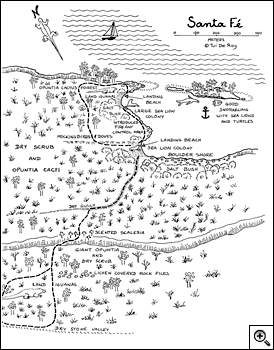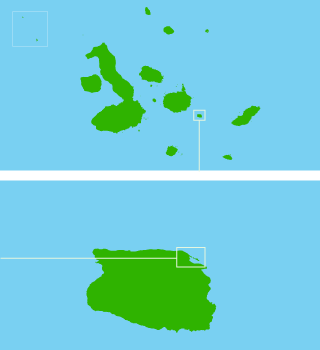


Permitted Uses:  Interpretive Group Tour with a Naturalist Guide Interpretive Group Tour with a Naturalist Guide  Photography and filming Photography and filming  Caminatas guiadas Caminatas guiadas  Associated Activities authorized by the GNPS in the itineraries of Authorized Vessels Associated Activities authorized by the GNPS in the itineraries of Authorized Vessels

|
The visitor site Santa Fe, is located on the northeast end of the island bearing the same name.
Of the two species of land iguanas present in Galapagos, the Conolophus subcristatus inhabits Plaza Sur, Santa Cruz, North Seymour/Baltra, Isabela and Fernandina, however the species Conolophus pallidus only lives in Santa Fe. It is distinguished mainly by the larger and paler color (hence its scientific name).
Of the six endemic species of rats that lived in the Galapagos two survive at present, in Fernandina (Nesorysomis narboroughi) and in Santa Fé (Oryzomis bauri).
|
|

Click on the illustration to enlarge.
|
In 1971 the population of goats was eradicated on this island. In 1985 and 1988 the presence of red ants or fire ants (Wasmania auropunctata) was reported, for which immediate control and eradication was performed.
The species of giant tortoise at this location was one of the first extinc.
Studies according to Geist D.J suggests that Santa Fe could be the oldest Galapagos volcano, there are sub-aerial rocks dating back 3.9 million years. It also mentions that the island of Santa Fe has a mix of underwater lava pushed to the surface by uprising and lava that were deposited subsequently to the uprising.
Another added attraction is the presence of giant tunas that have a trunk wider than in any other island.
Special Indications
-
Land iguanas are hard to find here. Warn visitors that they might not see any.
-
Parts of the trail are pending. Tell visitors that there are places very steep and with loose stones.
-
It is very rocky (especially at the beginning), you have to climb a steep ravine with loose gravel, please note that the return can be quite slippery.
|


![]()


![]()